Résultats de la recherche pour "advanced OR programming OR with OR stm32 OR microcontrollers"
-

Elektor Digital Advanced Programming with STM32 Microcontrollers (E-book)
Master the software tools behind the STM32 microcontroller This book is project-based and aims to teach the software tools behind STM32 microcontroller programming. Author Majid Pakdel has developed projects using various different software development environments including Keil MDK, IAR Embedded Workbench, Arduino IDE and MATLAB. Readers should be able to use the projects as they are, or modify them to suit to their own needs. This book is written for students, established engineers, and hobbyists. STM32 microcontroller development boards including the STM32F103 and STM32F407 are used throughout the book. Readers should also find it easy to use other ARM-based development boards. Advanced Programming with STM32 Microcontrollers includes: Introduction to easy-to-use software tools for STM32 Accessing the features of the STM32 Practical, goal oriented learning Complete code available online Producing practical projects with ease Topics cover: Pulse Width Modulation Serial Communication Watchdog Timers I²C Direct Memory Access (DMA) Finite State Machine Programming ADCs and DACs External Interupts Timers and Counters
€ 29,95
Membres € 23,96
-

Elektor Digital Programming with STM32 Nucleo Boards (E-book)
STM32 Nucleo family of processors are manufactured by STMicroelectronics. These are low-cost ARM microcontroller development boards. This book is about developing projects using the popular Nucleo development board. In the early chapters of the book, the architecture of the Nucleo family is briefly described. Software development tools that can be used with the Nucleo boards such as the Mbed, Keil MDK, TrueSTUDIO, and the System Workbench are described briefly in later Chapters. The book covers many projects using most features of the STM32 Nucleo development boards where the full software listings for Mbed and System Workbench are given for every project. The projects range from simple flashing LEDs to more complex projects using modules and devices such as GPIO, ADC, DAC, I²C, LCD, analog inputs and others. In addition, several projects are given using the Nucleo Expansion Boards, including popular expansion boards such as solid-state relay, MEMS and environmental sensors, DC motor driver, Wi-Fi, and stepper motor driver. These Expansion Boards plug on top of the Nucleo development boards and simplify the task of project development considerably. Features of this book Learn the architecture of the STM32 microcontrollers Learn how to use the Nucleo development board in projects using Mbed and System Workbench Toolchains Learn how to use the Nucleo Expansion Boards with the Nucleo development boards Update The Mbed compiler has been replaced with two software packages: The Mbed Studio and Keil Studio Cloud. Both of these software packages are free of charge and are available on the Internet. If you need assistance using the Keil Studio Cloud, please download the Guide below.
€ 34,95
Membres € 27,96
-
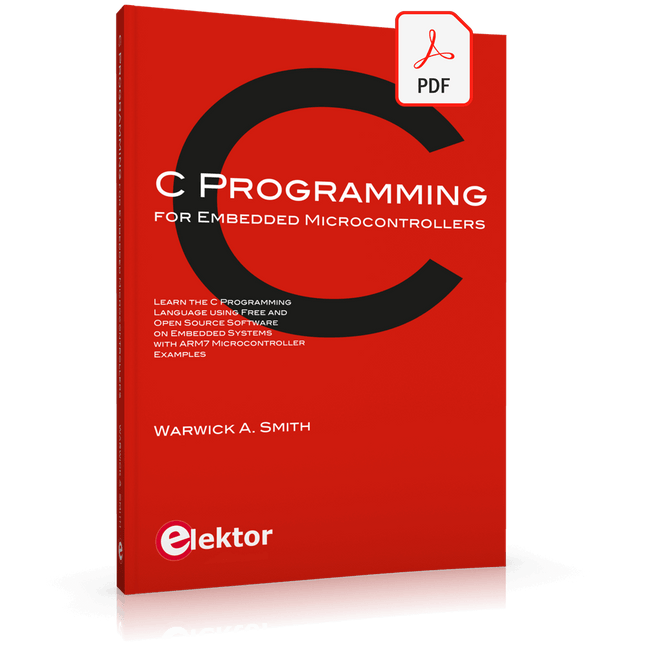
Elektor Digital C Programming for Embedded Microcontrollers (E-book)
Technology is constantly changing. New microcontrollers become available every year and old ones become redundant. The one thing that has stayed the same is the C programming language used to program these microcontrollers. If you would like to learn this standard language to program microcontrollers, then this book is for you! ARM microcontrollers are available from a large number of manufacturers. They are 32-bit microcontrollers and usually contain a decent amount of memory and a large number of on-chip peripherals. Although this book concentrates on ARM microcontrollers from Atmel, the C programming language applies equally to other manufacturer’s ARMs as well as other microcontrollers. Features of this book Use only free or open source software. Learn how to download, set up and use free C programming tools. Start learning the C language to write simple PC programs before tackling embedded programming - no need to buy an embedded system right away! Start learning to program from the very first chapter with simple programs and slowly build from there. No programming experience is necessary! Learn by doing - type and run the example programs and exercises. Sample programs and exercises can be downloaded from the Internet. A fun way to learn the C programming language. Ideal for electronic hobbyists, students and engineers wanting to learn the C programming language in an embedded environment on ARM microcontrollers.
€ 29,95
Membres € 23,96
-
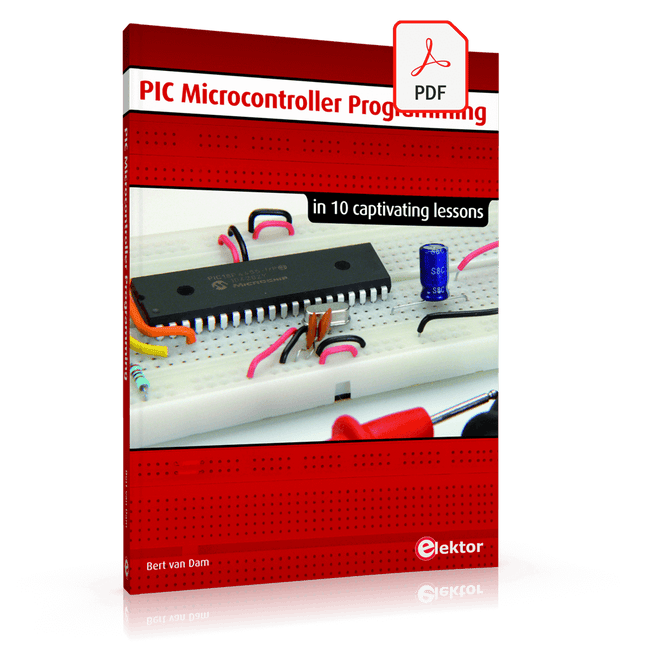
€ 29,95
Membres € 23,96
-
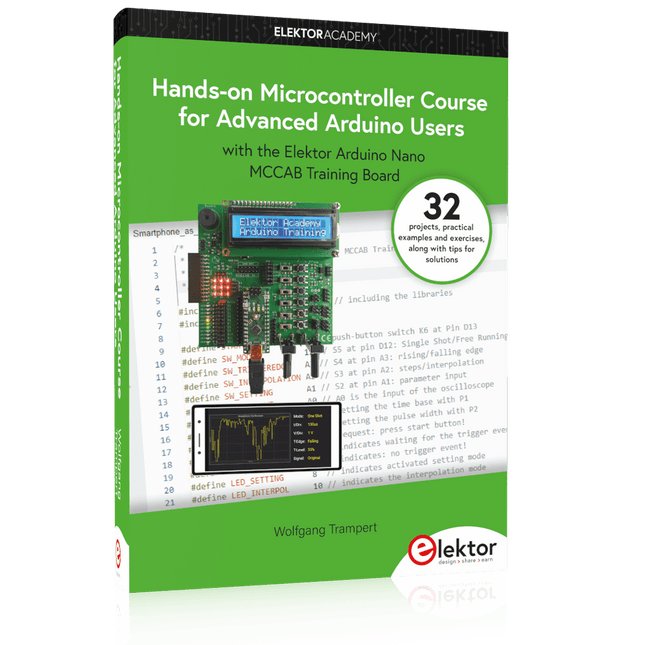
Elektor Publishing Hands-on Microcontroller Course for Advanced Arduino Users
32 new Projects, Practical Examples and Exercises with the Elektor Arduino Nano MCCAB Training Board Electronics and microcontroller technology offer the opportunity to be creative. This practical microcontroller course provides you with the chance to bring your own Arduino projects and experience such moments of success. Ideally, everything works as you imagined when you switch it on for the first time. In practice, however, things rarely work as expected. At that point, you need knowledge to efficiently search for and find the reason for the malfunction. In this book for advanced users, we delve deep into the world of microcontrollers and the Arduino IDE to learn new procedures and details, enabling you to successfully tackle and solve even more challenging situations. With this book, the author gives the reader the necessary tools to create projects independently and also to be able to find errors quickly. Instead of just offering ready-made solutions, he explains the background, the hardware used, and any tools required. He sets tasks in which the reader contributes their own creativity and writes the Arduino sketch themselves. If you don’t have a good idea and get stuck, there is, of course, a suggested solution for every project and every task, along with the corresponding software, which is commented on and explained in detail in the book. This practical course will teach you more about the inner workings of the Arduino Nano and its microcontroller. You will get to know hardware modules that you can use to realize new and interesting projects. You will familiarize yourself with software methods such as ‘state machines,’ which can often be used to solve problems more easily and clearly. The numerous practical projects and exercise sketches are once again realized on the Arduino Nano MCCAB Training Board, which you may already be familiar with from the course book ‘Microcontrollers Hands-on Course for Arduino Starters’, and which contains all the hardware peripherals and operating elements we need for the input/output operations of our sketches. Readers who do not yet own the Arduino Nano MCCAB Training Board can purchase the required hardware separately, or alternatively, build it on a breadboard.
€ 49,95
Membres € 44,96
-

Elektor Publishing MicroPython for Microcontrollers
Projets avec Thonny-IDE, uPyCraft-IDE et ESP32 Le langage de programmation « Python » a connu un énorme essor ces dernières années. Enfin, divers systèmes monocarte tels que le Raspberry Pi ont contribué à sa popularité. Mais Python a également été largement utilisé dans d’autres domaines, comme l’intelligence artificielle (IA) ou l’apprentissage automatique (ML). Il est donc évident d'utiliser également Python ou la variante « MicroPython » pour une utilisation dans les SoC (Systems on Chip). Des contrôleurs puissants tels que l'ESP32 d'Espressif Systems offrent d'excellentes performances ainsi que des fonctionnalités Wi-Fi et Bluetooth à un prix abordable. Avec ces fonctionnalités, la scène Maker a été prise d’assaut. Comparé à d'autres contrôleurs, l'ESP32 dispose d'une mémoire Flash et SRAM nettement plus grande, ainsi que d'une vitesse de processeur beaucoup plus élevée. Grâce à ces caractéristiques, la puce convient non seulement aux applications C classiques, mais également à la programmation avec MicroPython. Ce livre présente l'application des systèmes modernes à puce unique. En plus du contexte technique, l'accent est mis sur MicroPython lui-même. Après l’initiation au langage, les compétences en programmation acquises sont immédiatement mises en pratique. Les projets individuels conviennent aussi bien à une utilisation en laboratoire qu'à des applications quotidiennes. Ainsi, outre l’effet d’apprentissage réel, l’accent est également mis sur le plaisir de construire des appareils complets et utiles. En utilisant des planches à pain de laboratoire, des circuits de toutes sortes peuvent être réalisés avec peu d'effort, transformant les tests et le débogage des projets 100 % homebrew en un plaisir instructif. Les différentes applications, telles que les stations météorologiques, les voltmètres numériques, les télémètres à ultrasons, les lecteurs de cartes RFID ou les générateurs de fonctions, rendent les projets présentés parfaitement adaptés aux cours pratiques ou aux travaux de matières et d'études en sciences naturelles ou aux cours de sciences et technologies.
€ 39,95
Membres € 35,96
-
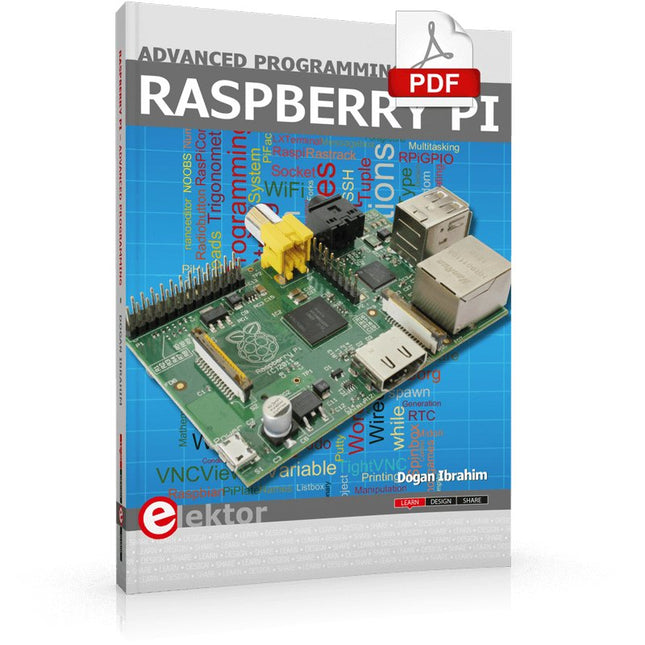
Elektor Digital Raspberry Pi Advanced Programming (E-book)
This book is about advanced programming of the Raspberry Pi computer using the Python programming language. The book explains in simple terms and with examples: How to configure the Raspberry Pi computer; How to install and use the Linux operating system and the desktop; How to write advanced programs using the Python programming language; How to use graphics in our programs; How to develop hardware based projects using the Raspberry Pi. The book starts with an introduction to the Raspberry Pi computer and covers the topics of purchasing all the necessary accessories and installing and operating the Linux operating system in command mode. The network interface of the RPi is explained in simple steps, demonstrating how the computer can be accessed remotely from a desktop or a laptop computer. The remaining parts of the book cover the Python programming language in detail, including advanced topics such as operating system calls, multitasking, interprocess synchronization and interprocess communication techniques. The important topic of network programming using UDP and TCP protocols is described with working examples. The Tkinter graphical user interface module (GUI) is described in detail with example widgets and programs. The last part of the book includes hardware projects based on using the advanced programming topics such as multitasking and interprocess communication techniques. All the projects given in the book have been fully tested and are working. Complete program listings of all projects are provided with detailed explanations.
€ 34,95
Membres € 27,96
-
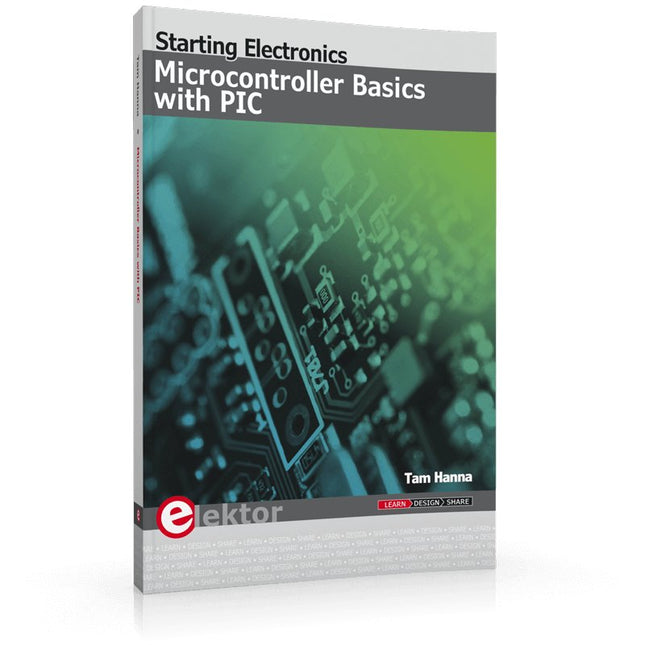
Elektor Publishing Microcontroller Basics with PIC
Dans ce livre, l'auteur présente tous les aspects essentiels de la programmation des microcontrôleurs, sans surcharger le lecteur avec des informations inutiles ou quasi pertinentes. Après avoir lu le livre, vous devriez être capable de comprendre et de programmer des microcontrôleurs 8 bits. L'introduction à la programmation des microcontrôleurs s'effectue à l'aide de microcontrôleurs de la série PIC. Pas vraiment à la pointe de la technologie avec seulement 8 bits, le micro PIC a l'avantage d'être simple à comprendre. Il est proposé dans un boîtier DIP, largement disponible et pas trop complexe. La fiche technique complète du micro PIC est plus courte de plusieurs décennies que la description de l'architecture décrivant la section processeur d'un microcontrôleur avancé. La simplicité a ici ses avantages. Après avoir maîtrisé le fonctionnement fondamental d’un microcontrôleur, vous pourrez facilement entrer plus tard dans le domaine des softcores avancés. Après avoir placé le code assembleur comme langage de programmation exécutif au premier plan dans la première partie du livre, l'auteur atteint un niveau plus profond avec le « C » dans la deuxième partie. Parallèlement au sujet officiel, le livre présente des trucs et astuces, une technologie de mesure intéressante, des aspects pratiques de la programmation des microcontrôleurs, ainsi que des options pratiques pour faciliter le travail, le débogage et la recherche de pannes.
€ 39,95
Membres € 35,96
-

Elektor Digital MicroPython for Microcontrollers (E-book)
Projets avec Thonny-IDE, uPyCraft-IDE et ESP32 Le langage de programmation « Python » a connu un énorme essor ces dernières années. Enfin, divers systèmes monocarte tels que le Raspberry Pi ont contribué à sa popularité. Mais Python a également été largement utilisé dans d’autres domaines, comme l’intelligence artificielle (IA) ou l’apprentissage automatique (ML). Il est donc évident d'utiliser également Python ou la variante « MicroPython » pour une utilisation dans les SoC (Systems on Chip). Des contrôleurs puissants tels que l'ESP32 d'Espressif Systems offrent d'excellentes performances ainsi que des fonctionnalités Wi-Fi et Bluetooth à un prix abordable. Avec ces fonctionnalités, la scène Maker a été prise d’assaut. Comparé à d'autres contrôleurs, l'ESP32 dispose d'une mémoire Flash et SRAM nettement plus grande, ainsi que d'une vitesse de processeur beaucoup plus élevée. Grâce à ces caractéristiques, la puce convient non seulement aux applications C classiques, mais également à la programmation avec MicroPython. Ce livre présente l'application des systèmes modernes à puce unique. En plus du contexte technique, l'accent est mis sur MicroPython lui-même. Après l’initiation au langage, les compétences en programmation acquises sont immédiatement mises en pratique. Les projets individuels conviennent aussi bien à une utilisation en laboratoire qu'à des applications quotidiennes. Ainsi, outre l’effet d’apprentissage réel, l’accent est également mis sur le plaisir de construire des appareils complets et utiles. En utilisant des planches à pain de laboratoire, des circuits de toutes sortes peuvent être réalisés avec peu d'effort, transformant les tests et le débogage des projets 100 % homebrew en un plaisir instructif. Les différentes applications, telles que les stations météorologiques, les voltmètres numériques, les télémètres à ultrasons, les lecteurs de cartes RFID ou les générateurs de fonctions, rendent les projets présentés parfaitement adaptés aux cours pratiques ou aux travaux de matières et d'études en sciences naturelles ou aux cours de sciences et technologies.
€ 32,95
Membres € 26,36
-
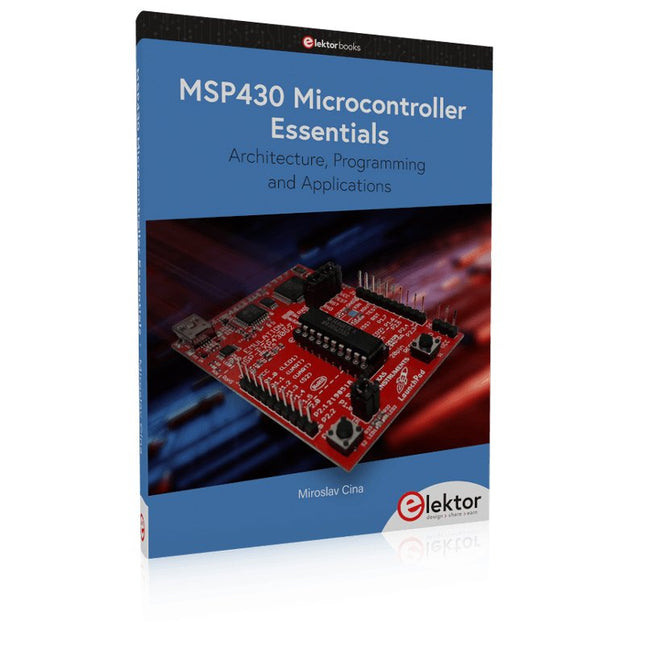
Elektor Publishing MSP430 Microcontroller Essentials
Architecture, Programming and Applications The MSP430 is a popular family of microcontrollers from Texas Instruments. In this book we will work with the smallest type, which is the powerful MSP430G2553. We will look at the capabilities of this microcontroller in detail, as it is well-suited for self-made projects because it is available in a P-DIP20 package. We will take a closer look at the microcontroller and then build, step by step, some interesting applications, including a 'Hello World' blinking LED and a nice clock application, which can calculate the day of the week based on the date. You also will learn how to create code for the MSP microcontroller in assembler. In addition to that, we will work with the MSP-Arduino IDE, which makes it quite easy to create fast applications without special in-depth knowledge of the microcontrollers. All the code used in the book is available for download from the Elektor website.
€ 39,95
Membres € 35,96
-
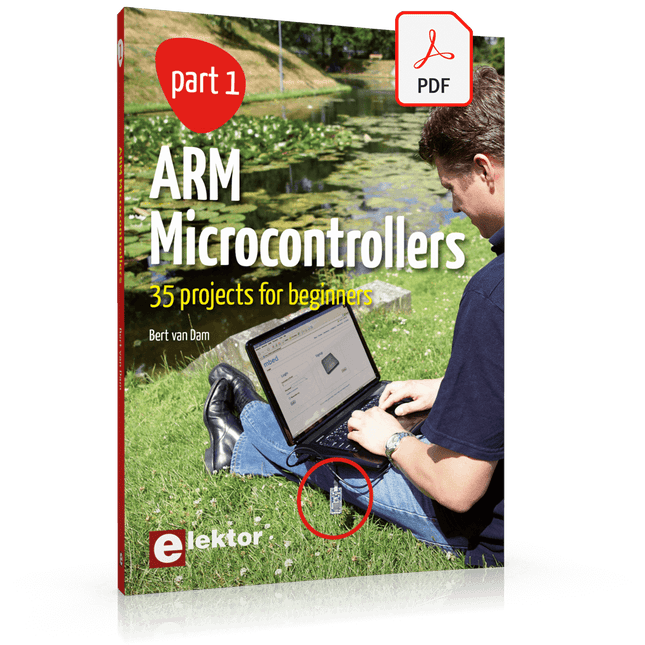
Elektor Digital ARM Microcontrollers (EN) | E-book
35 Projects for Beginners This book is for hobbyists, students and engineers who want to learn C and how to use an mbed ARM microcontroller in an easy and fun way, without the need for cumbersome software installations. ARM mbed microcontroller NXP LPC1768 The projects in this book are meant for beginners in C and ARM microcontrollers. That doesn't mean the projects are simple, but it does mean that they are easy to understand. We use for example USB communications, a subject that is made so easy by the mbed that it is suitable for a beginners book. Cloud technology The mbed NXP LPC1768 uses cloud technology, a revolutionary concept in software development. This means you do not need to install software on your PC in order to program the mbed! The only thing you need is a browser such as Microsoft Internet Explorer, and a USB port on your PC. You can get access to your project from any PC anywhere in the world and continue working on it. When you are done a few simple mouse clicks transfer the program to your mbed hardware. Of course you can optionally download the projects and store them on your own PC. Features of this Book Learn how to program an mbed ARM microcontroller using cloud technology. No complicated software installation on your PC needed. Learn programming in C by doing fun and interesting projects. No previous experience or knowledge required. Examples of projects in this book: flashing light, timer, light activated switch, digital thermometer, people detector, USB communication, talking microcontroller, debugging, sound switch, and much more - 35 projects in total. Examples of C subjects in this book: variables, commands, functions, program execution, pointers (introduction).
€ 29,95
Membres € 23,96
-

Elektor Publishing Mastering Microcontrollers Helped by Arduino (3rd Edition)
Third, extended and revised edition with AVR Playground and Elektor Uno R4 Arduino boards have become hugely successful. They are simple to use and inexpensive. This book will not only familiarize you with the world of Arduino but it will also teach you how to program microcontrollers in general. In this book theory is put into practice on an Arduino board using the Arduino programming environment. Some hardware is developed too: a multi-purpose shield to build some of the experiments from the first 10 chapters on; the AVR Playground, a real Arduino-based microcontroller development board for comfortable application development, and the Elektor Uno R4, an Arduino Uno R3 on steroids. The author, an Elektor Expert, provides the reader with the basic theoretical knowledge necessary to program any microcontroller: inputs and outputs (analog and digital), interrupts, communication busses (RS-232, SPI, I²C, 1-wire, SMBus, etc.), timers, and much more. The programs and sketches presented in the book show how to use various common electronic components: matrix keyboards, displays (LED, alphanumeric and graphic color LCD), motors, sensors (temperature, pressure, humidity, sound, light, and infrared), rotary encoders, piezo buzzers, pushbuttons, relays, etc. This book will be your first book about microcontrollers with a happy ending! This book is for you if you are a beginner in microcontrollers, an Arduino user (hobbyist, tinkerer, artist, etc.) wishing to deepen your knowledge,an Electronics Graduate under Undergraduate student or a teacher looking for ideas. Thanks to Arduino the implementation of the presented concepts is simple and fun. Some of the proposed projects are very original: Money Game Misophone (a musical fork) Car GPS Scrambler Weather Station DCF77 Decoder Illegal Time Transmitter Infrared Remote Manipulator Annoying Sound Generator Italian Horn Alarm Overheating Detector PID Controller Data Logger SVG File Oscilloscope 6-Channel Voltmeter All projects and code examples in this book have been tried and tested on an Arduino Uno board. They should also work with the Arduino Mega and every other compatible board that exposes the Arduino shield extension connectors. Please note For this book, the author has designed a versatile printed circuit board that can be stacked on an Arduino board. The assembly can be used not only to try out many of the projects presented in this book but also allows for new exercises that in turn provide the opportunity to discover new techniques. Also available is a kit of parts including the PCB and all components. With this kit you can build most of the circuits described in the book and more. Datasheets Active Components Used (.PDF file): ATmega328 (Arduino Uno) ATmega2560 (Arduino Mega 2560) BC547 (bipolar transistor, chapters 7, 8, 9) BD139 (bipolar power transistor, chapter 10) BS170 (N-MOS transistor, chapter 8) DCF77 (receiver module, chapter 9) DS18B20 (temperature sensor, chapter 10) DS18S20 (temperature sensor, chapter 10) HP03S (pressure sensor, chapter 8) IRF630 (N-MOS power transistor, chapter 7) IRF9630 (P-MOS power transistor, chapter 7) LMC6464 (quad op-amp, chapter 7) MLX90614 (infrared sensor, chapter 10) SHT11 (humidity sensor, chapter 8) TS922 (dual op-amp, chapter 9) TSOP34836 (infrared receiver, chapter 9) TSOP1736 (infrared receiver, chapter 9) MPX4115 (analogue pressure sensor, chapter 11) MCCOG21605B6W-SPTLYI (I²C LCD, chapter 12) SST25VF016B (SPI EEPROM, chapter 13) About the author Clemens Valens, born in the Netherlands, lives in France since 1997. Manager at Elektor Labs and Webmaster of ElektorLabs, in love with electronics, he develops microcontroller systems for fun, and sometimes for his employer too. Polyglot—he is fluent in C, C++, PASCAL, BASIC and several assembler dialects—Clemens spends most of his time on his computer while his wife, their two children and two cats try to attract his attention (only the cats succeed). Visit the author’s website: www.polyvalens.com.Authentic testimony of Hervé M., one of the first readers of the book:'I almost cried with joy when this book made me understand things in only three sentences that seemed previously completely impenetrable.'
€ 49,95
Membres € 44,96











